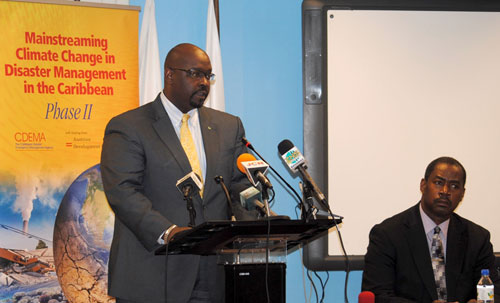|
From:TheBahamasWeekly.com Bahamas Information Services Updates
Nassau The Bahamas – The effects of climate change will have the potential to drastically change the landscape of The Bahamas and its residents, the Minister of the Environment and Housing the Hon Kenred Dorsett told a workshop on Monday, September 23, 2013. He was addressing The Climate Smarting Comprehensive Disaster Management Country Work Programme opening ceremony on behalf of the Rt. Hon. Perry Christie, Prime Minister of the Commonwealth of the Bahamas, at the Ministry of Youth Sports and Culture conference room on Thompson Boulevard. Captain Stephen Russell, Director of the National Emergency Management Agency and Lyndon Robertson, project coordinator, Caribbean Disaster Emergency Management Agency, CDEMA, also addressed the opening ceremony. The workshop, slated for September 23 to 27, 2013 aims to develop a strategic country work programme for comprehensive disaster management that is climate smart and gender-sensitive, amongst other things. It also seeks to educate participants of Climate Change Adaptation (CCA) and its need to be integrated into The Bahamas’ Comprehensive Disaster Management (CDM) Programme. Facilitated by the Caribbean Disaster Emergency Management Agency, CDEMA and the National Emergency Management Agency, NEMA, the workshop further seeks to identify peculiar needs of The Bahamas for achieving Comprehensive Disaster Management and to determine what concrete changes are needed to address these needs. Recently, many studies have highlighted the effects and impact of climate change on The Bahamas and the wider Caribbean, which calls for measures to be put in place to counteract the effects. In March 2012, a CARIBSAVE Partnership study assessed that 15 low-lying states in the Caribbean were particularly vulnerable to climate change and needed to “develop pragmatic response strategies to reduce vulnerability and enhance resilience”. And, The Bahamas, like the other 14 Participating States is experiencing coastal erosion and expect to see changes in average atmospheric temperature, reduced average annual rainfall, increased sea surface temperatures and the potential for an increase in the intensity of tropical storms. Additionally, there is a predicted increase in the intensity of tropical storms and hurricanes. “All of this is dire news and we must begin to act now to help secure our countries,” Mr. Dorsett said. “As developing countries and small island states, we will be the first and the hardest hit.” With continued coastal and beach erosion and the rising sea level, the country’s tourism product will be threatened, he said. “The effects of climate change will be great and have the potential to drastically change the lives we live now. The livelihood of almost every fisherman and farmer will be threatened and thereby food security. The quality of water and its availability is also threatened,” he said. In The Bahamas these threats are almost replicated on each island and cay, covering over 100,000 square miles. “Our work to mitigate the effects of climate change must be replicated throughout the length and breadth of The Bahamas. This makes it that much more challenging for us and much more necessary that we intervene now,” Mr. Dorsett said. In this vein, he regarded the workshop as both timely and relevant. The overall objectives are to: enhance the understanding of vulnerability to natural and anthropogenic hazards in the Caribbean; expansion of Country Work Plan activities and responsibility; agreement on the outcome and output level results for the national CDM Programme, amongst other things. In 2012, a significant template for The Bahamas’ fist Country Work Plan was created by a number of government agencies in collaboration with CDEMA and NEMA. These agencies were charged with the responsibility of keeping the plan and maintaining it every three years. The Bahamas Government has begun the process of identifying vulnerable areas throughout the country and intends to enforce land use and building code policies. The Bahamas Environmental Scientific and Technology (BEST) Commission and the Ministry of Works and Urban Development are tasked with monitoring, the implementation and enforcement of these policies supported by legislation. Additionally, the Bahamas National Geographic Information Systems (BNGIS) will assist the mentioned agencies with the execution of these responsibilities through collaborating and supplying spatial data and maps.
|
